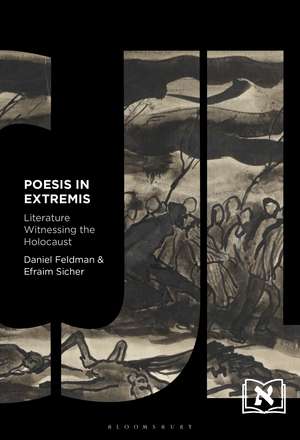Poesis in Extremis: Literature Witnessing the Holocaust: Comparative Jewish Literatures
Autor Prof. or Dr. Daniel Feldman, Prof. or Dr. Efraim Sicheren Limba Engleză Hardback – 7 feb 2024
Preț: 540.15 lei
Preț vechi: 773.88 lei
-30% Nou
Puncte Express: 810
Preț estimativ în valută:
103.38€ • 106.54$ • 87.28£
103.38€ • 106.54$ • 87.28£
Carte tipărită la comandă
Livrare economică 03-17 martie
Preluare comenzi: 021 569.72.76
Specificații
ISBN-13: 9798765100189
Pagini: 272
Dimensiuni: 152 x 229 x 22 mm
Greutate: 0.53 kg
Editura: Bloomsbury Publishing
Colecția Bloomsbury Academic
Seria Comparative Jewish Literatures
Locul publicării:New York, United States
Pagini: 272
Dimensiuni: 152 x 229 x 22 mm
Greutate: 0.53 kg
Editura: Bloomsbury Publishing
Colecția Bloomsbury Academic
Seria Comparative Jewish Literatures
Locul publicării:New York, United States
Caracteristici
Sheds new light on literature from the ghetto, enriching the field of trauma literature in general and in relation to the Holocaust in particular
Notă biografică
Daniel Feldman is Senior Lecturer of English Literature at Bar-Ilan University, Israel, with a focus on Holocaust literature and children's literature. His scholarship has been recognized with the Children's Literature Association Honor Article, the Children's Literature Association Judith Plotz Emerging Scholar Honor Award, and two research grants from the Israel Science Foundation. He is the author of a series of articles on the depiction of the Holocaust in Polish, German, Hebrew, and English poetry and prose. His research has appeared in Comparative Literature, Partial Answers, Children's Literature in Education, Children's Literature, Lion and the Unicorn, and Children's Literature Association Quarterly.Efraim Sicher is Emeritus Professor of English and Comparative Literature at Ben-Gurion University, Israel, and is author of The Holocaust Novel (2005) and editor of the Dictionary of Literary Biography volume on Holocaust Novelists (2004). His most recent books include The Jew's Daughter: A Cultural History of a Conversion Narrative (2017), Re-envisioning Jewish Identities: Reflections on Contemporary Israeli and Diaspora Culture (2021), and Postmodern Love in the Contemporary Jewish Imagination: Negotiating Identities and Spaces (2022).
Cuprins
AcknowledgmentsIntroduction (Daniel Feldman and Efraim Sicher)Part I1. Elie Wiesel's Night: Literature as Testimony (Efraim Sicher)Part II2. A Poetics of the Holocaust?: Celan, Sutzkever, Milosz (Efraim Sicher)3. Writing Nothing: Negation and Subjectivity in the Holocaust Poetry of Paul Celan and Dan Pagis (Daniel Feldman)4. Miklós Radnóti: Postcards from a Death March (Efraim Sicher)5. Wladymir Szlengel's Ghetto Poems: Writing to the Dead (Daniel Feldman)6. "Poem in a Bottle": Itzhak Katzenelson's Song of the Murdered Jewish People (Daniel Feldman)Part III7. Translating Oral Memory in Ida Fink's "Traces" (Daniel Feldman)Postscript (Daniel Feldman and Efraim Sicher)NotesBibliographyIndex
Recenzii
Well researched and insightful, this book closes a major gap in Holocaust studies by discussing the role of literature, and particularly that of poetry, as testimony in the spiritual lives of victims during as well as after the Holocaust.
This inspiring study gives a new slant on the vexed question of literary art of the Holocaust era. Through detailed readings of works by such writers as Elie Wiesel and Wladyslaw Szlengel, Ida Fink and Miklós Radnóti, Feldman and Sicher compellingly argue that poetic rather than documentary testimony was the most 'radical outlet' for witnesses' grief and horror. This important book reaffirms the crucial role of poetry after Auschwitz.
This inspiring study gives a new slant on the vexed question of literary art of the Holocaust era. Through detailed readings of works by such writers as Elie Wiesel and Wladyslaw Szlengel, Ida Fink and Miklós Radnóti, Feldman and Sicher compellingly argue that poetic rather than documentary testimony was the most 'radical outlet' for witnesses' grief and horror. This important book reaffirms the crucial role of poetry after Auschwitz.




